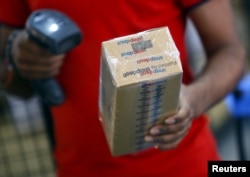Two years ago, when Poornima Vardhan launched 335th.com, an online venture for selling fitted clothing, she was prepared for the hurdles she encountered. “The challenges that we faced are usual in terms of regulations, we had to apply for sales tax, which took a long time. There’s a whole process you have to go through which is quite archaic,” she recalls.
An entrepreneur setting up business in India this year may find the going much easier. Prime Minister Narendra Modi has set up a $1.5 billion fund to boost start-ups, offered tax breaks and promised to dramatically cut red tape in a country notorious for bureaucratic hurdles. He says a mobile app will allow start-ups to set up business within a day and has promised cheaper and faster patent applications.
It is the first ever effort by policy makers to sustain a start-up boom India has witnessed in recent years. The government hopes that these entrepreneurs will help create much-needed jobs in a country where 12 million people enter the workforce every year.
e-Commerce boom
About 19,000 start-ups have mushroomed in recent years, most of them in e-commerce. Over the next decade, they are expected to multiply five fold and provide employment to 3.5 million people. The start-up scene is being sustained by the world’s fastest growing population of smart phone owners and Internet users.
Mohandas Pai, former director with software company Infosys, says India will remain a start-up hotspot. “No country in the world, barring the United States, has the number of technology people that India has, and the cost is so low. And the cost of hardware and cloud is coming down so much that it is very, very easy to have a startup, leverage technology and do business.”
The potential of India’s start-ups has attracted overseas investors who pumped in about $8.5 billion last year. That included prominent global investors such as SoftBank and Alibaba.
In recent months, however, investors have become more cautious about putting in money amid signs of trouble in several online ventures. Although some of India's biggest success stories, such as online retailers Flipkart and Snapdeal, have reached multi-billion dollar valuations, most Indian start-ups have failed to turn in a profit so far. After growing at break-neck speed, some companies have laid off scores of employees, raising worries that India’s start-up boom is a bubble that could burst.
But many investors discount those fears, confident that although the Indian start-up sector is still a work in progress, it will thrive. Their optimism is based on the brisk growth that India is posting at a time when most countries are facing an economic downturn.
Cause for optimism
Among the optimists is Sasha Mirchandani, founder of Kae Capital in Mumbai, which has been investing in start-ups. According to Mirchandani, “India is the only market growing, and penetration levels in most categories are so low across any business, so there is opportunity across the spectrum in any sector you look at, and with a proactive government like ours, it just adds to the scheme of things.” He says the “game’s not even started.”
That is what the government hopes as it holds out the promise of being “friend and mentor” to the sector. While technology start-ups are hogging the limelight, it is urging entrepreneurs to also focus on innovation in manufacturing and agriculture.
Prime Minister Modi also hopes that the focus will not be just on creating high-value companies. “A start-up does not mean that it is worth a billion dollars and 2,000 people are employed. That is not necessary. Even if I create five jobs, my start-up is helping move the nation forward,” said Modi while launching the start-up initiative.
Entrepreneurs, on their part, are excited about the future with more and more willing to give up the safety of jobs and tread new ground. Poornima Vardhan, who returned to India to launch her start-up after doing a stint on Wall Street, says she is glad the government has acknowledged entrepreneurs, but is confident it would thrive anyway. “I think the talent that is coming out and going to start-ups is amazing. The kind of capital, people have access to today is unheard of.”









